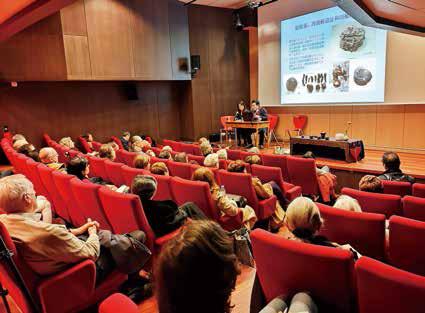My Visit to Paris
2019-02-25ShaZhou
Sha Zhou
This is my second visit to Paris for a cultural exchange program. Twelve years ago, I went to Paris as a member of a Chinese delegation. This time, I travel alone as my colleague was not able to fly with me.
A few hours after the jet took off from Shanghai Pudong Airport, I know I am crossing the Mongolian Plateau in the air. Suddenly it occurs to me that I am actually following one of the ancient Silk Roads across the grassy steppe. The route stretched all the way from the forests in northeastern China all the way through Eurasia punctuated by steppes, forests, mountains, flatlands. Nomads lived there for centuries. The Silk Roads across the vast landmass saw rise and fall of dynasties and empires. The Chinese civilization has grown through long historical cultural and material exchanges with the rest of the world.

The author of the article makes his lecture at China Culture Center in Paris.
I realize that as a scholar on Silk Roads, I am carrying a mission of cultural exchanges on my shoulders, which coincides with the historical mission of the Silk Roads.
It is not the first time that I will make a public speech in an international cultural exchanges program. But this time, I am going to hold a public lecture made through government arrangements.
I have prepared the lecture carefully on the basis of my studies and research results over years. The lecture goes in three parts. In the first part, I screen some PPT images and then relate stories and explain what these objects mean. In the second part, I project a short documentary to give more vivid images to further explain tea, silk and porcelain. The last part is an interaction process in which audience members are able to take part in a performance of a tea ceremony passed down to us from the Song Dynasty about 1,000 years ago.
The audience response indicates that the lecture is a success. They take notes, they take photos, they ask questions, they whisper to each other, and they clap their hands excitedly.
The lecture ends at thirty after nine in the evening. Many stay to ask questions and many take photos of the tea sets brought all the way from China and enjoy the tea I prepare at the lecture. Another hour passes before the last audience members leave. After the lecture, the website of the China Cultural Center in Paris and the Chinese Culture website give an excellent coverage and think high of the lecture.
A Pilgrimage to UNESCO Headquarters
Personally, UNESCO has a sacred place in my heart. My passion and curiosity about Silk Roads were kindled in my college years when I first read a Chinese edition of Courier, a UNESCO publication. I remember my encounter with Courier very clearly. It was at the reading room for graduates and teachers at the Library of Hangzhou University. The issue of the UNESCO Courier was all about Silk Roads across Eurasia, about how tea, porcelain, silk, jade, agate, and metals were carried and traded along the routes. The reading inspired me. In order to read the issue thoroughly, I made a copy of the issue, which cost me the cash for half a months expenditure.
After I finished undergraduate studies, I wanted to embark upon a graduate course on the history of Chinas ties with the rest of the world or Silk Roads or Dunhuang. Back then, universities and colleges across the country didnt take great interest in these fields. Eventually I took a graduate course on the history of Mongolia and the Yuan Dynasty under the guidance of Mr. Huang Shijian at Hangzhou University. Mr. Huang worked at the Inner Mongolian University before he came to Hangzhou. After I attained the masters degree, however, I gave up the idea of working at Dunhuang. The Silk Roads became my hobby. The research work I did focused largely on the ancient international ties between the coastal provinces in Chinas southeast and Japan and Korea across the sea.
The Belt & Road Initiative brought back my passion for the Silk Roads. Now my attention is refocused upon Silk Roads as my work has been closely associated with Forum on Oriental Cultures, an annual international event in Hangzhou since five years ago. Thanks to my knowledge accumulated over the past decades, I have been able to work efficiently for the forum. The lecture I give in Paris is a presentation based on the research results I have done in the half of my life. What I have done academically is no longer an individual matter. It is now on a national platform for international cultural exchanges.
I do not enter the UNESCO headquarters and I dont need to. This is just a pilgrimage trip to pay my homage to UNESCO that inspired me so many years ago and has made my life meaningful.
